So here we are – our twenties disappearing behind us and our thirties on the horizon ahead. It’s been a helluva voyage to get here but we did it. The worst economic crisis since the Great Depression? We weathered it. A choppy job market? We managed to sail on through. We’ve kept on course with our student loans and we’ve finally made it here. After enduring all that, we might be tempted to think we’ve managed to figure out a thing or two about how the world works – but now’s no time to get cocky.
It’s at this critical point in our lives where our perspectives and attitudes about the world begin to solidify; where we start treating our theories as facts. We’re going to carry these ideas with us as we begin the next leg of our journey, and we need to make sure we’re not weighed down by the wrong ones. The following are five lies we need to jettison now (and the truths we should navigate by instead).
“I’m One of the Good Guys”
As men, we’re subjected to a very particular image of how the world supposedly works.
The heroes of our stories are, for the most part, mild-mannered guys, content to mind their own business before getting roped into some adventure. They get bitten by radioactive spiders. They get befriended by their building’s resident karate-master. They stumble across a magical sword, or someone comes along to tell them they’re a wizard or the chosen one or the long-lost prince of the butt-goblins. And sure, they get knocked down a few times, but at the end of the day, they beat the bad guy, rescue the princess, and any scars they get only make them look more badass.
While most of us aren’t holding out for superpowers, we do naturally tend to view ourselves as the protagonists of our own stories. This can be a particular danger for our own generation, though before anyone starts rolling their eyes – don’t worry. This isn’t going to be yet another screed painting Millennials as entitled, selfish, napkin-industry-killing snowflakes. Despite our reputation (or even because of it), this generation consistently demonstrates superlative work ethic, social responsibility, and genuine interest in inclusivity. We like to think of ourselves as enlightened and honorable – but it’s exactly because of these good qualities that we’re at risk of creating a false image.
“I have the right opinions. I’m open-minded. I’m polite, sensitive, and non-confrontational. I don’t buy into that raging alpha macho bullshit. I’ve spent the last decade being a responsible, decent adult – things are going to work out in the end. They have to!”
That’s not going to cut it.
Please don’t misunderstand – these are all fantastic qualities (ones we should aspire to have). They still don’t guarantee a damn thing. In spite of what books, TV, and movies all tell us, the home team doesn’t always win, the quiet guys don’t always get the love interest, and integrity isn’t always rewarded.
And that’s okay.
Well, it’s not okay, but we’ll get to that in a minute.
The truth we need to learn is that the universe doesn’t owe us anything for not being assholes. That might seem obvious, but when we slip into telling ourselves this lie, it’s typically because we’re trying to encourage ourselves. We’re telling ourselves that things will work out, so long as we keep being (just “being”) scrappy underdogs. Even with the best intentions, it’s still a lousy mentality – one that reduces decency into a kind of currency.
“I’m a good guy – why aren’t women throwing themselves at me? I’m a good guy – why am I being passed over for promotions? I’m a good guy – why am I living in a crummy apartment above a meth lab and beneath a tap dancing studio?”
Left to fester, this sense of entitlement will poison us. As years roll on and the lives we want don’t magically materialize, we’ll start to wonder what’s going wrong. Turned against ourselves, that frustration becomes resentment and despair (with very real implications for our mental health). Directed against others, it becomes toxic (even dangerous).
It’s a painful lesson to learn, but we have to realize that we’re not special. We’re not guaranteed anything – not romance, not comfort, not stability. It’s a frightening prospect, but it’s only when we realize this that we can actually start pursuing those things (and doing so with genuine authenticity).
“Everything Will Be Fixed Once I…”
…Once I land my dream job. Once I complete my master’s degree. Once I publish that novel. Once I fall in love. Once I get shredded. Once I buy my own place.
At this particular point in our lives, developing a bad case of tunnel vision isn’t at all uncommon. We’ve spent the better part of the past decade learning how to make our way in the world, and the more items off our adulthood list, the easier it becomes to imagine that whatever’s left is the final piece of some existential puzzle. We might not consciously think that “X will complete me,” but we’ll probably be devoting so much time and energy to it that we don’t give any thought to anything beyond. Sure, it’s important to visualize success, but we still need to ask ourselves what comes after the “happily ever after.”
Let’s say we get the perfect job; the one we’ve been sweating, straining, and sacrificing for. Now what? Well, now we have to clock in on time every day. We have to deal with whoever keeps microwaving sardines in the breakroom. We still have to deal with all the trials and tribulations of day to day life, and do it all, year in, year out. Same principle applies to our dream house. Sure, there are going to be days when we’ll sit on the porch watching the deer glide along the misty shoreline. There will also be days when our roofs leak and rabid squirrels infest our attics.
Like it or not, life keeps going.
We need to maintain our physiques, our homes, our relationships. If we’re not prepared for the reality of that, there’s a good chance we’ll burn out. An idealized image of success is still a distorted one, and while it might make for a great motivator, the tiniest hiccup is going to bring it all crashing down around us. Ironically, it’s only when we let go of the idea of being “completed” that we enjoy and benefit from the things we have. Don’t look for completion, look for progress.
That’s especially important when we tell ourselves that…
“Life Ends At 30”
It sure can feel like it sometimes.
For those of us who came into our own in the wake of the Great Recession, it can feel like we’ve been robbed of a decade. We had to struggle to find work. When we finally found jobs, we had to contend with stagnant wages and the ever-present threat of getting laid off in a stormy economy. Between work, side gigs, student loans, and the general pressure to prove ourselves as responsible, independent adults, it might feel like we spent our years out of college just trying to stay afloat. Now, with our thirties on the horizon, we might look back on our lives and wonder where our twenties went.
Granted, this one’s not totally on us. Not entirely, at least.
“Life ends at thirty” has been a myth ever since the days when life actually did end at thirty. While the specifics have varied across history, there’s almost always been a period of life where young people (at least, young men) have been allowed, even expected, to explore our world, figure themselves out, and generally enjoy freedom before settling down. With our twenties rapidly vanishing (or already gone), we might feel crippling existential panic or devastating heartbreak at having missed the “best years of our lives.” We might find ourselves asking: Where’s my never-ending bacchanalia? Where’s my close circle of attractive, intelligent friends – all of whom live within walking distance of me and who take spur-of-the-moment road trips to Vegas? Where’s my spacious apartment in New York or LA that I can somehow afford on a part-time marmoset-groomer’s salary?
Nowhere.
They don’t exist. They never did.
We get bombarded with the carefree twenties image by movies, magazines, and especially TV, but it’s simply not real. Once we kill that myth, we can finally recognize the good news: it gets better.
None of this is to feed you some cheesy “life begins at thirty” line. It’s liberating, however, to remember that life is what you make of it. Sure, there will be pressure to conform to a specific model of what milestones a man should hit by age thirty, and while the pressure never goes away, it does get a whole lot easier to deal with. Yes, our twenties still matter (albeit in different ways). Yes, we’re getting older (and we have to be smart about how we use our time). Even so, we’re going to be entering into our thirties with a much, much clearer idea of what we actually want and how to get it. Our thirties give us the freedom to experiment and explore while still offering a base level of security. Simply put – our thirties are like our twenties, only with money. Our thirties are like our twenties, but with experience. Our thirties are like our twenties, but with refined tastes and the ability to make it home safely at night. In short: we know what we want – we know how to get it. We decide what life ought to be – not some arbitrary number of laps around the sun.
“Life’s Not Fair”
It isn’t, but not in the way we might think.
What that phrase is supposed to mean is that things don’t always work out the way we’d like. People get sick. Earthquakes strike. Fires wipe out homes. Outdoor weddings get ruined by marauding seagulls. Shit happens.
Unfortunately, the phrase is frequently repurposed as a lazy way of writing off unnecessary suffering, stupidity, and injustice. Instead of being a gentle reminder that our best efforts might still fail, it becomes an easy way to excuse ourselves from the responsibility of sticking up for others (or for ourselves). We desperately convince ourselves that all jobs are soul-crushing. We tell ourselves that everyone gets screwed by their insurance companies and internet providers. We insist that crawling through miserable, smoggy traffic to some dismal apartment is just the way life is – we have to bear it with quiet dignity.
Because if we don’t tell ourselves that…
…Well, that would mean things could be different. It would mean we’d have a right – maybe even a responsibility – to ask for more. It would mean we have choices – and those can be scary.
In a sense, this is the dark flipside to the lie we tell ourselves about being the “good guys.” Rather than the universe magically giving us everything we want, the universe will give us whatever it gives – either way, it’s out of our hands (pretty much the dictionary definition of “living in bad faith”).
But here’s the truth: Life should be fair.
We should be able to live with dignity. We should be able to pursue our interests. We should be able to do all of that without having to beg, bow, or grovel before some taskmaster boss or an irrational customer (complaining that his cheese-pizza has dairy). While there are benefits to being stoic and serene, we do ourselves a massive disservice by imagining we don’t have any agency at all. Sure, we can’t control the world, but we can influence it. It’s not always easy, and not something we can always do alone, but this is where the importance of being a leader truly comes into play.
History is full of people who were told, “That’s the way the world is” and responded by saying, “Then the world needs to change.” As simple as it would be to throw up our hands and surrender, there’s no escape from the fact that the world can be a better place and we have a chance to change it. No, we can’t always get what we want – we still have a right to want it.
“Life Is About Being Happy”
At first glance, that seems like a pretty reasonable expectation. “Of course, life is about being happy. What else is there?”
Well, everything.
This isn’t just about the people who use self-care as an excuse to be self-indulgent or buy into mindless consumerism – the problem goes a lot deeper than that. And it’s not that there’s anything wrong with happy – it’s that there’s so much more to life than that.
Happiness is an emotion, and emotions are fleeting. When we measure the worth and quality of our lives against something that is, by its nature, temporary, we only wind up making ourselves anxious and miserable. We inevitably find ourselves asking: Am I happy now? Am I as happy as I possibly could be? What’s going to make me happy the longest?
And that’s not even touching on the question of what “happiness” even means.
Is a millionaire snorting a small mountain of cocaine actually “happy” because his pleasure receptors are lighting up? Does a well-to-do restaurant critic enjoy existence more than a destitute Bulgarian pensioner who spends his life collecting money for orphans? Are we happy when we lose ourselves in a video game, or are we distracted?
Strange as it might sound, there’s no better way of making ourselves miserable than by making happiness the point of life. That battle will have us constantly measuring ourselves against some imaginary level of orgasmic bliss. It puts a premium on every moment and every activity. We might have a calm, quiet, productive day, but if it’s not a strictly “happy” day, then we’re led to understand that it’s somehow “deficient.”
The good news is that we don’t have to feel guilty.
It’s okay to always want more. It’s okay to struggle. It’s okay to just be okay.
There will be times when we’ll feel good, there will be times when we’ll have fun, there will be times when we’ll achieve serene satisfaction, and there will be times when we experience none of those things (and still have lives worth living). Regret, discomfort, sorrow (even boredom) might not be pleasant, but they’re essential in shaping our growth and fostering our fullest potential.
If we’re going to be truly joyful, we need to set our sights on something a lot less short-lived than some vague sense of gratification. What that guiding star might be, only you can decide. Perhaps harmony in the grand order of things. Perhaps an authentic degree of freedom. Perhaps some kind of hope in defiance of all despair. There’s integrity, passion, pride – the list goes on and on.
Make no mistake – wanting to just be happy isn’t asking too much.
It’s asking for far too little.



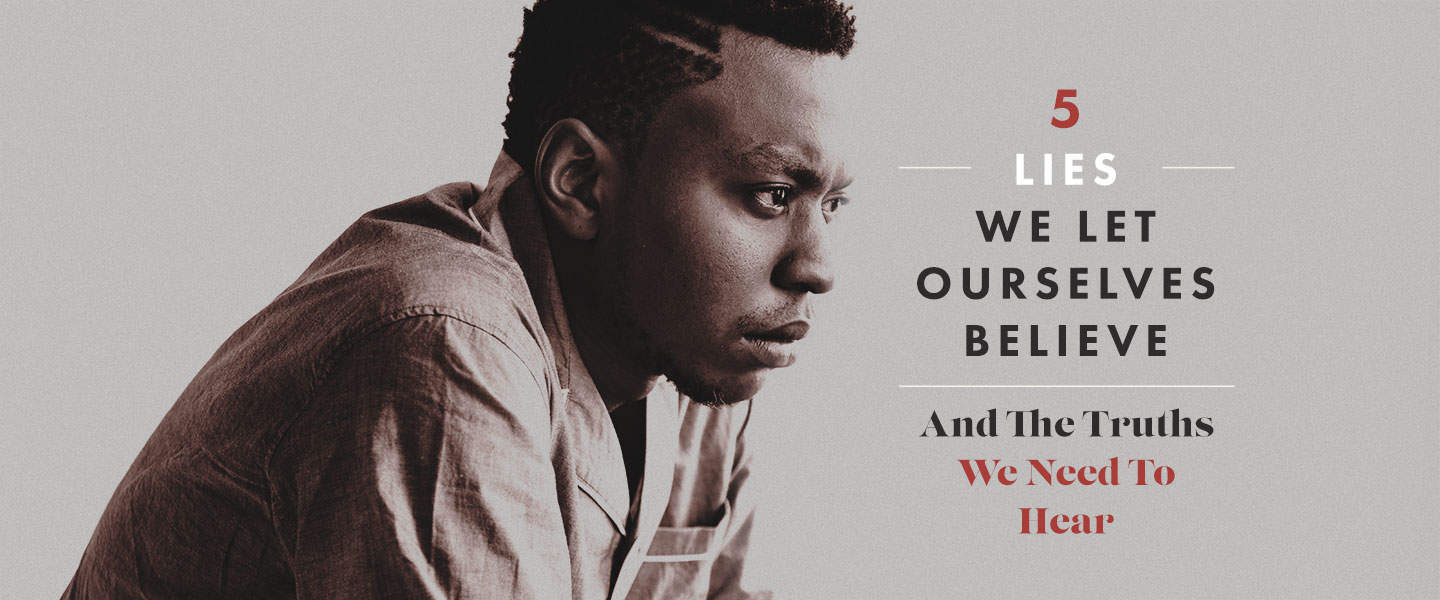
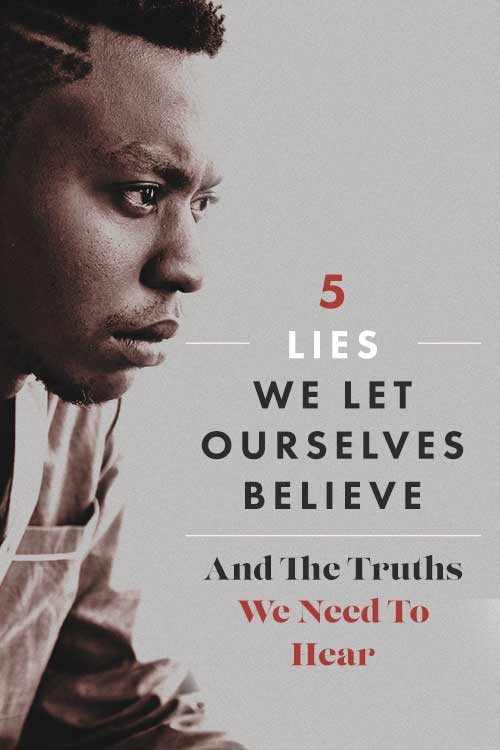
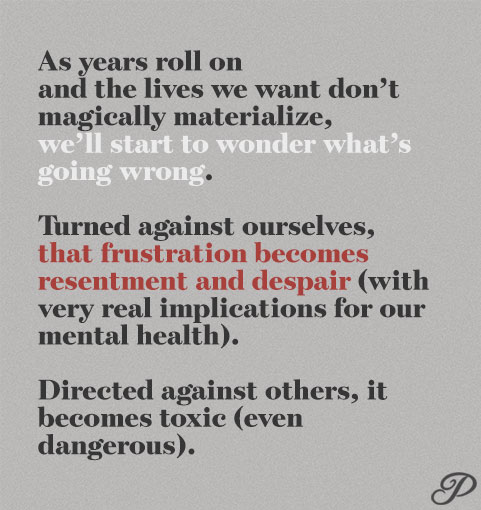
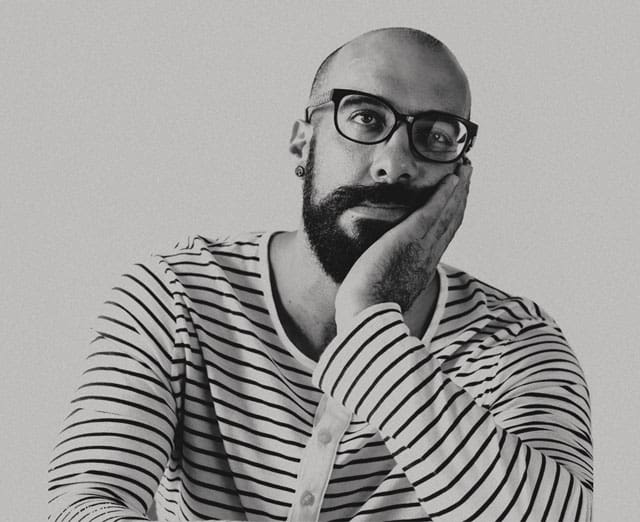
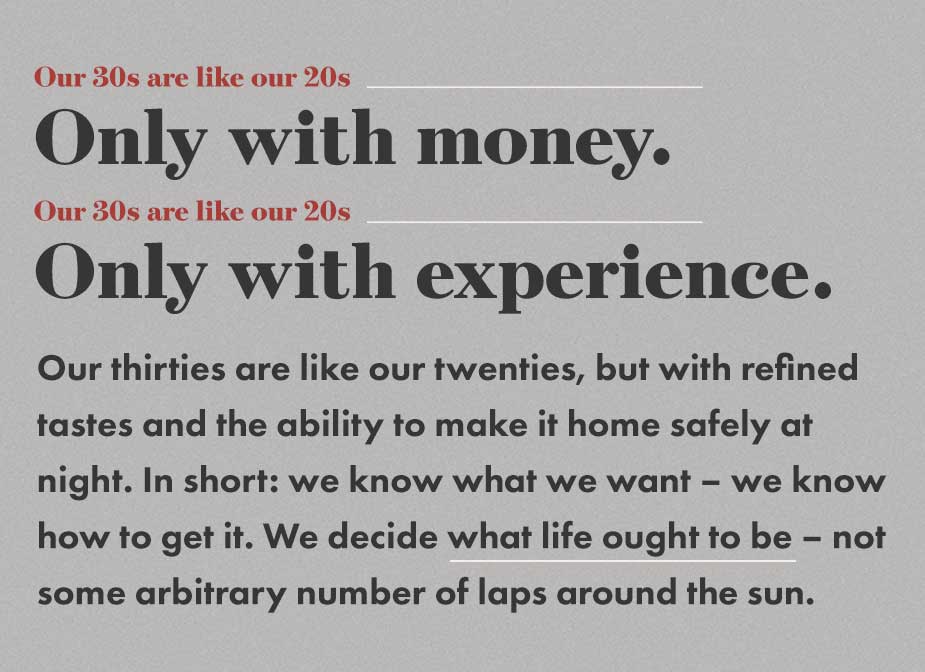
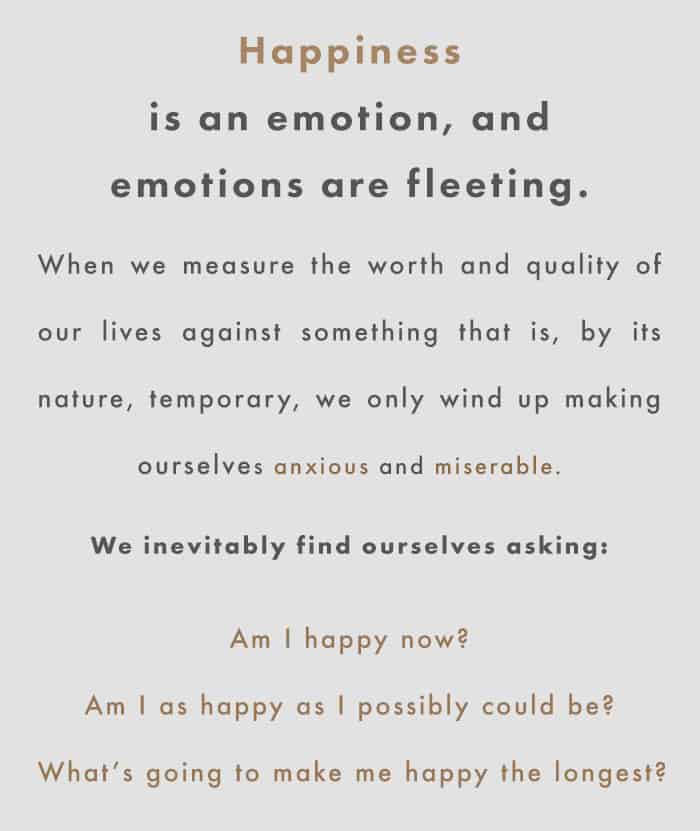





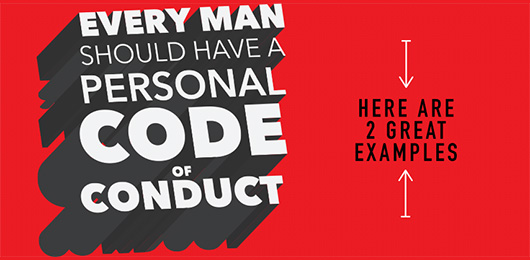


![It’s Time to Begin Again: 3 Uncomfortable Frameworks That Will Make Your New Year More Meaningful [Audio Essay + Article]](https://www.primermagazine.com/wp-content/uploads/2025/01/begin_again_feature.jpg)



